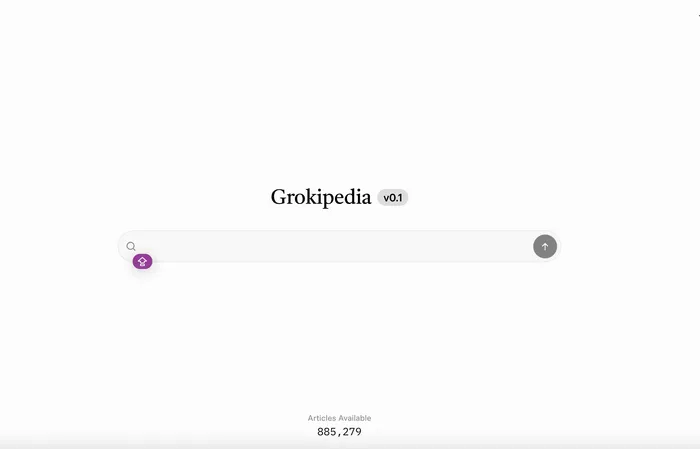
.
Image: grokipedia.com
On October 27, 2025, Musk’s artificial intelligence company xAI unveiled Grokipedia, an AI-powered encyclopedia that aims to rival, and perhaps supplant Wikipedia.
According to The Washington Post, Grokipedia went live with roughly 885,000 articles, compared to Wikipedia’s more than 8 million English-language entries.
Early visitors found a familiar layout, a minimalist search bar and an article layout, but a noticeably different tone.
Some pages, The Post noted, appeared “smaller, more opaque in their workings and more right-leaning in how they framed certain topics.”
The launch comes after months of public sparring between Musk and Wikipedia’s leadership, and years of complaints from the billionaire that the free encyclopedia has a “liberal bias.”
In many ways, Grokipedia is both a product and a protest: a new platform born from Musk’s ideological feud with one of the internet’s oldest knowledge institutions.
At first glance, Grokipedia looks like a standard reference site. Its homepage, labelled “Grokipedia v0.1,” features an understated black-and-white interface and a simple prompt inviting users to “Ask Grok.”
Beneath the hood, however, lies xAI’s proprietary large-language model, the same AI system that powers the chatbot Grok within X (formerly Twitter).
According to The Post, Grokipedia’s entries are automatically generated and updated by xAI’s model, which draws on a blend of publicly available data and posts from the X platform.
Musk has said the goal is to build a “truth-oriented” knowledge engine, free from what he calls the “woke editorial bias” of Wikipedia’s volunteer community.
In practice, that vision has already sparked controversy. Observers noted that Grokipedia’s entry on gender opens with: “Gender refers to the binary classification of humans as male or female based on biological sex,” a definition far narrower than Wikipedia’s framing of gender as a social and cultural construct. Other articles reportedly contained factual errors or unverified claims, such as overstating politician Vivek Ramaswamy’s recent roles.
Despite those stumbles, Musk has framed Grokipedia as a “new paradigm for knowledge creation,” one driven by machine intelligence rather than consensus editing.
Musk’s feud with Wikipedia didn’t start with technology; it started with perception.
In January 2025, Musk called for a boycott of Wikipedia, telling his 190 million X followers to “Defund Wikipedia until balance is restored.”
The trigger: a sentence in his Wikipedia biography describing a salute he made at Donald Trump’s inauguration celebration as “compared to a Nazi gesture.”
Wikipedia co-founder Jimmy Wales defended the description as factually sourced, which only deepened Musk’s outrage.
From there, his criticisms expanded. Musk began referring to the site as “Wokipedia,” accusing it of systemic left-wing bias and calling its reliance on “mainstream media propaganda” unsalvageable.
He also questioned how the Wikimedia Foundation spends donations, repeating, according to Le Monde, a misleading claim that the nonprofit devotes tens of millions of dollars annually to diversity initiatives.
Behind the bluster lies a consistent worldview that Musk distrusts socially governed, open-source institutions and prefers algorithmic authority over human consensus. In his telling, volunteer editing creates “bias by bureaucracy,” while AI can restore “objective truth,” an irony, given how opaque Grokipedia’s own algorithms are.
Grokipedia is Musk’s answer to that critique, an attempt to build a new reference system where AI, not community editors, curates information.
As The New York Times noted, it’s part of Musk’s wider strategy to integrate his AI models, social networks and media ventures into a single digital ecosystem spanning X, xAI, and now Grokipedia.
By hosting both the data and the discussion, Musk gains what Wikipedia never allowed: control. Where Wikipedia’s openness disperses power among millions of contributors, Grokipedia centralises it, algorithmically and institutionally, in Musk’s hands.
That shift worries experts. Transparency advocates told The Post that Grokipedia “risks creating a closed-loop of Musk-approved truth,” especially if its AI draws heavily from the politically charged discourse on X. Others warn that removing human editorial oversight may make factual verification harder, not easier.
Grokipedia isn’t just Elon Musk’s attempt to out-Wikipedia Wikipedia, but perhaps the latest move by the billionaire to control how information itself is defined.
Where Wikipedia asks the world to agree, Grokipedia asks the world to trust, trust in algorithms, in AI, and ultimately, in Musk.
Whether that vision can coexist with the open-source ideals of the web remains the biggest question of all.
